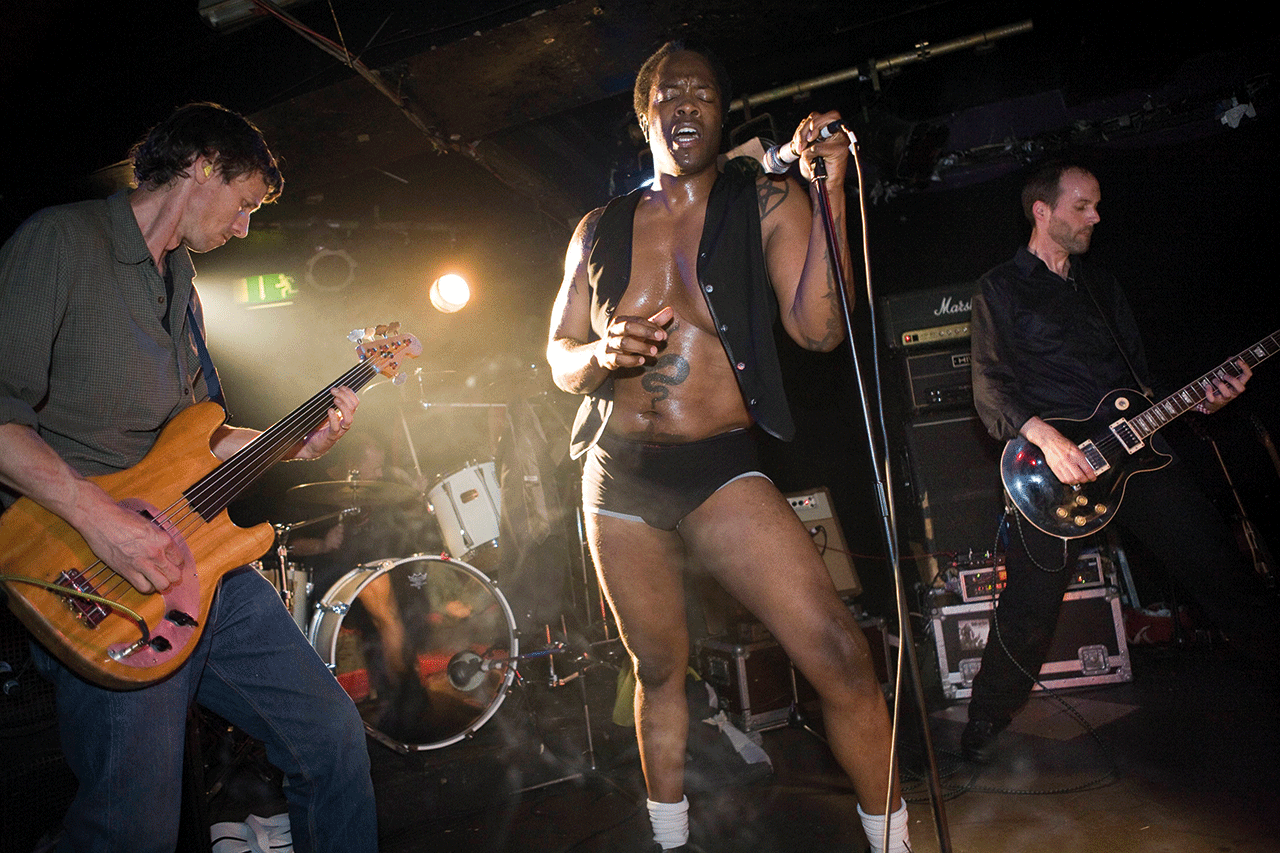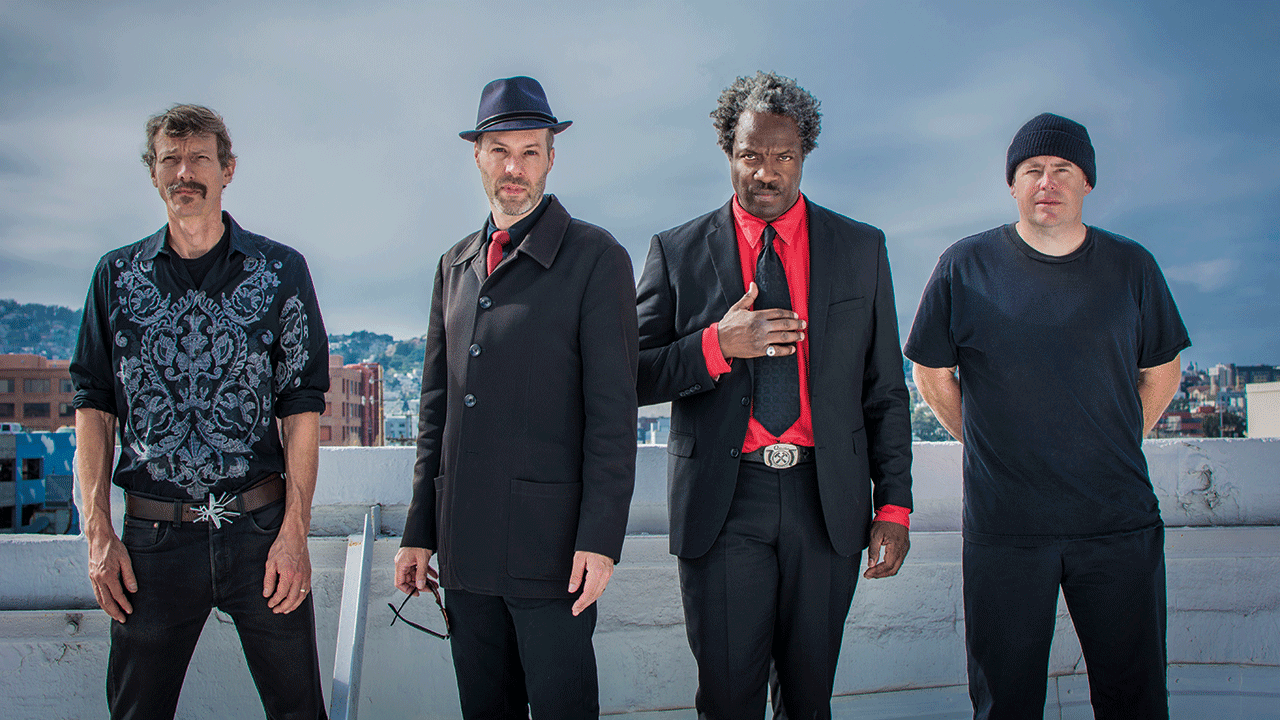Oxbow. The last thing anyone should attempt is to try to put any sort of finger on what they do. Gutter blues? Experimental noise-rock? Classical grandiosity as filtered through the heroin-addled veins of 60s jazz? Psychedelic waves of sonic torture? Or, as they were once tagged, “The greatest art rock band in the world”? Sure. Why not? But Oxbow are all of that and much, much more. And much, much more confounding in their execution of it; whatever ‘it’ is. No doubt you’ve noticed the calamity and chaos upending the state of political and social affairs at home, in mainland Europe and beyond. While some international unease and turmoil has come on the heels of governments and world events, those in the trenches know it’s more than coincidental that the present-day disarray is rushing in alongside the return of this San Francisco quartet after 10 years of relative quiet.
“Making music as a pipeline into the soul, spirit or psyche is something to which one can aspire forever,” asserts bassist Dan Adams, in conveying the band’s modus operandi. “Oxbow has always made music aiming to link into the human soul, spirit and psyche, so it’s not too hard to see making this music as a lifelong vocation. Really, it is an honourable pursuit.”
While it’s preposterously difficult to nail down Oxbow musically, it’s not as challenging to decode why the band’s history is as volatile, incendiary and outright entertaining as its sonic output. Formed as a studio/recording project in 1988 by vocalist Eugene Robinson and guitarist Niko Wenner after they dissolved Whipping Boy – a band known for their unique take on hardcore/punk and being championed by Dead Kennedys – Oxbow quickly became as notorious for their leftfield aural architecture and confrontational live shows. For every wrenching exegesis of emotion that was delivered from behind creepy- crawling guitars, dextrous rhythmic patterning and banshee-like ululations, there were notorious gigs that usually saw the imposing Eugene stripping off his dapper suit and yanking ‘little Eugene’ as life’s pain, artistic expression and a public lashing of psycho-sexual demons collided on the cramped stages of juke joints and dive bars throughout Europe and the US.

Alongside every exploratory offering of musical ineffability, there was take-no-prisoners Eugene, using his skill as a fighter – he still trains five days a week while working towards his black belt in Brazilian ju-jitsu – to choke out disrespectful rowdies who mocked his nudity, rained pints on the band in showery shows of misunderstanding or didn’t know when to stop crying, “Play faster!” Their album titles and the tales behind them are as esoteric as you’d imagine: Fuckfest (their 1989 debut – Eugene describes it as his suicide note to a suicide that never happened), 1996’s Serenade In Red (which featured, and fractured their relationship with, Marianne Faithfull), 2002’s An Evil Heat (a recording session so intense that producer Gibbs Chapman left the music industry), 2007’s The Narcotic Story (the tale of an acquaintance who made millions after stints in rehab and psychiatric institutions) and now, 10 years on, we have their seventh full-length, Thin Black Duke.
“Asking ‘Who is the Thin Black Duke?’ is like asking ‘Who is the Merchant Of Venice?’ don’t you think? Or if we wanted to push it: ‘Who is the rain?’” responds Eugene when asked about the latest album’s titular character, chiding in a manner that combines the eloquence and wit befitting his Stanford University education and the playfully abstract puzzles of the performance art scene he experienced whilst coming of age in 1970s New York City. “While there are many merchants in Venice, the characterisation of one makes it significant. So our Duke is based, as much of the Oxbow cosmology is, on a real person, not a character. It’s serious. It’s the whole world. Blood issues. Existential issues. There is nothing more crucial and crushing than continued existence, especially as it drives you closer to non-existence. If you’re dealing with life in a very real way, it is heavy beyond measure, mostly connected to the fact that death is so much less romantic now.”
Subterranea’s interpretation of Thin Black Duke likens a philosophical and surreal protagonist comparable to Rat Pack entertainment icon Sammy Davis Jr – a man who commands Eugene’s respect, not least for being a student of the fistic arts, but also for his ability to look at odds in the eyes and say ‘fuck it’ – combined with a noir-ish exposition on what happens after commerce crumbles artistic expression and the soul of the creator. But in atypical-typical Oxbow fashion, nothing and everything makes sense and is followed up with a “but…” and giant question marks looming overhead that cast open-ended shadows of doubt over the totality of their work. A decade between albums? It’s no surprise Thin Black Duke is labyrinthine.
“I love Sammy Davis Jr,” says Eugene of the man who graced the sleeve of Oxbow’s 1991 King Of The Jews album, “but you’re off base, even if there is a conceptual thread running through this, and every, Oxbow record. I’m rarely writing about things that are not very real and they’re revealed to almost anyone paying attention, though it’s not at all necessary to pay attention to enjoy what we’re doing. How much am I willing to reveal? All of it. The deaths of loved ones, marriages, children, divorces, diseases, drugs, despair, violence and a kind of moral terror crammed into a musical framework. That’s what the record is about.”
“I wanted shorter songs, more tuneful and still 100% Oxbow, the guitar in standard tuning only,” says principle composer Niko Wenner, turning to how he approached writing the new record, making it at once their most orchestrated and rockin’ work. “I make the music on our records make sense as a whole, and for this I wanted to make this album’s music stick together in a particular way. This time, the glue would be the way the refrain in a children’s song grounds everything in the song. I’ve always been fascinated by the way small elements can bind together a whole. You see it in architecture, painting and music; compact ideas reappearing in different ways, adding up to a satisfying whole. I wanted to make every song, and every moment of music, as much as humanly possible, reflect the whole. It’s the most realised of our albums, meaning I did everything that I wanted to. Often that meant doing, and playing, much less,” he expresses.
Thin Black Duke was not only 10 years in the making, it was also fucking expensive. After the band’s label, Hydra Head, scaled back dramatically on its release activity and there was little concrete interest elsewhere, they started opening up their own billfolds – because nothing stops Oxbow’s creative wellspring. They spent $40,000 of their own money before Hydra Head agreed to help with the manufacturing home stretch and distribution (a crowdfunding campaign designed to recoup half their initial losses raised over $6,000 from more enthusiastic fans). In throwing your heart and soul into decades of indescribable inaccessibility, none of this should be surprising. If one thing can be nailed down about Oxbow, it’s that its members share a near-pathological dedication and commitment to their craft. And when you exhibit that amount of devotion, punters will cotton on to return that allegiance in kind.
“This is our obsession,” enthuses Eugene, “but while you’re on your way to enjoying it, deriding it, not enjoying it, stealing it, recommending it, talking shit about it, know that the way it’s created is not magic. The surprising thing is that while we’ve only gotten $6,000 of our goal, it’s been wonderful to see the responses of people, to hear the stories about why they chose to give and what the music meant to them. Crowdfunding was the most honest thing anyone making music could have done.”
“My main concern with the extended creation process is the potential limitation this puts on what we can create,” concludes Dan about the decade that’s past and the ones to come. “At one per decade, there might not be too many Oxbow records left. On the other hand, the ideas flow profusely, we record lots of stuff, we would like to get more of what we do out there, and in the past we’ve worked much more quickly. All these things point to an unpredictable schedule. I’m pretty sure we’ll release more music in the next half-decade. There are also an infinite number of factors that could, at any instant in time, cause one or more of us to not be able to make music. Hopefully, these forces will stay at bay for a while.”
THIN BLACK DUKE IS RELEASED ON MAY 5 VIA HYDRA HEAD
Author & Punisher
Three of Eugene Robinson’s literary pursuits
A LONG SLOW SCREW (2009)
This novel was Eugene’s homage to Spillane, Tarantino and his own formative years in 70s NYC. A jewellery heist goes wrong, the violence is brutal and it’s like the characters were poured straight from the streets onto the page, but only in Eugene’s world and mind would the most brutal of NYC gangs be comprised entirely of gay dudes.
FIGHT (2010)
Subtitled Everything You Ever Wanted To Know About Ass-kicking But Were Afraid You’d Get Your Ass Kicked For Asking, Fight examines Eugene’s love of fisticuffs of all varieties. From traditional venues like boxing rings, MMA octagons and ice hockey rinks to his shadowy flight into an underworld involving secret government agencies and prisons, Eugene knuckles up and makes getting KO’d more fun than it should be. Includes the chapter ‘So: You’ve Been Stabbed’.
THE INIMITABLE SOUNDS OF LOVE: A THREESOME IN FOUR ACTS (2013)
We’ve all done some stupid things (and people) when the blood flows from brain to bits and Eugene’s (yet to be staged) play gives us 50-odd pages of comfort that we’re not alone.

